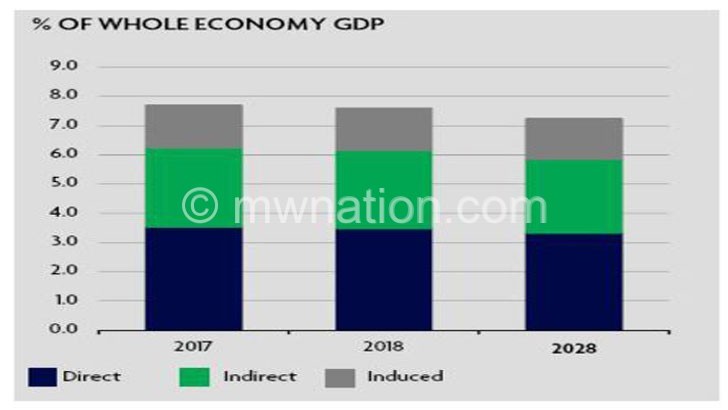Tourism contribution To GDP stalls—report
Malawi tourism sector contribution to the gross domestic product (GDP) has remained static at around seven percent for the past two years, a situation players in the sector say is worrisome.
Malawi Tourism Council (MTC), a grouping of tourism operators, said it is worrisome that the industry has not grown, observing that operators have been scrambling for the same market.

World Tourism and Travel Council (WTTC) figures show that at 7.7 percent total tourism contribution to GDP—total value of goods and services—the sector’s economic activities generated by hotels, travel agents, airlines and other passenger transportation services failed to grow in the two-year period to 2018.
In monetary terms, the sector’s contribution to GDP translates to $553 million (about K400 billion) annually.
This subdued growth has affected the sector’s job creation, with employment remaining at 6.7 percent of total employment at about 525 000 jobs.In 2016, the sector’s total contribution to the GDP was at 7.2 percent.
The Malawi Government recognises tourism as a priority sector that can be used as a vehicle for economic growth and poverty alleviation as outlined in the Malawi Growth and Development Strategy (MGDS) III.
MGDS III recognises that if developed, the tourism sector can promote job creation in both urban and rural areas.
Tourism also creates demand for farm and lake produce as well as for services such as carpentry, plumbing, repairs, transport and sale of curios and other goods to tourists, according to the report.
In the five-year period to 2022, MGDS III aspires investments in tourism support infrastructure, improved quality of tourism products and services as well as improved conservation and management of cultural heritage resources.
MTC board of trustees chairperson Oswald Bwemba said in an interview on Monday that while there is need for more efforts in selling Malawi as a tourism destination, investment in tourism product development should be significant to boost tourist numbers that can sustain the industry and, therefore, greater contribution to GDP.
“It is, therefore, not surprising that room occupancies for many operators have either dwindled or remained static because demand has not grown despite many players entering the market,” he said.
Earlier, Ministry of Trade, Industry and Tourism said Malawi’s tourism industry is losing out from lack of vibrancy on the domestic tourism front, appealing to players to have incentives in their service packages to motivate local tourists to patronise local tourist attraction sites to maximise their gains.
However, the ministry is yet to implement the Domestic Tourism Marketing Strategy, which seeks to sustain the growing local travel for sustainable local tourism.
The strategy, once implemented, is expected to contribute to tourism growth by about four to 15 percent of the country’s GDP by 2020.
WTTC figures indicate that in 2018, 91 percent of the total spending was domestic while nine percent accounted for international spending with business spending accounting for 75 percent and leisure spending at 25 percent. n





